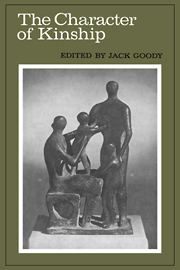Book contents
- Frontmatter
- Contents
- Dedication
- Introduction
- KINSHIP AND DESCENT
- THE NATURE OF KINSHIP
- Genetrix: Genitor:: Nature: Culture?
- The Long Term and the Short Term: the Economic and Political Significance of the Morality of Kinship
- The Kith and the Kin
- THE NATURE OF THE FAMILY
- MARRIAGE AND AFFINAL ROLES
- Bibliography of the Writings of Meyer Fortes
- References
- Index
The Kith and the Kin
Published online by Cambridge University Press: 07 May 2010
- Frontmatter
- Contents
- Dedication
- Introduction
- KINSHIP AND DESCENT
- THE NATURE OF KINSHIP
- Genetrix: Genitor:: Nature: Culture?
- The Long Term and the Short Term: the Economic and Political Significance of the Morality of Kinship
- The Kith and the Kin
- THE NATURE OF THE FAMILY
- MARRIAGE AND AFFINAL ROLES
- Bibliography of the Writings of Meyer Fortes
- References
- Index
Summary
When Meyer Fortes felt the need to find a term to express the peculiar quality of relationships between kin, that which distinguishes them from other sorts of relationship, it appears to me significant that he should have chosen ‘amity’. He suggests this word as the succinct rendering of the ‘set of normative premises…focused upon a general and fundamental axiom which I call the axiom of prescriptive altruism’. He ‘ascribes it to the realm of moral values in contraposition to the realm of jural values ordered to the politico-jural domain’ though, he adds, ‘the actualities of kinship relations and kinship behaviour are compounded of elements derived from both domains’ (Fortes 1969: 251).
The word ‘amity’ scarcely occurs earlier in his work, but it may be assumed that he did not choose it carelessly, for the concept is implicit in his thinking on the subject of kinship long before it appears in print. I do not recall him using it in his lectures on the subject which I attended between 1948 and 1950 and my lecture notes (unsurprisingly perhaps) do not mention the word, but when I encountered it in 1970 I recognised that it was naming an idea with which I was already acquainted from his work. The axiom of prescriptive altruism is called into existence by the initial assumption that everyman, individually or in solidarity with a collectivity with which he identifies himself, seeks his own interest and advancement, be it directly or through the medium of reciprocity, immediate or deferred, direct or by some system of exchange as complex and circuitous as the kula of the Trobriand Islanders and their neighbours.
- Type
- Chapter
- Information
- The Character of Kinship , pp. 89 - 106Publisher: Cambridge University PressPrint publication year: 1974
- 15
- Cited by



